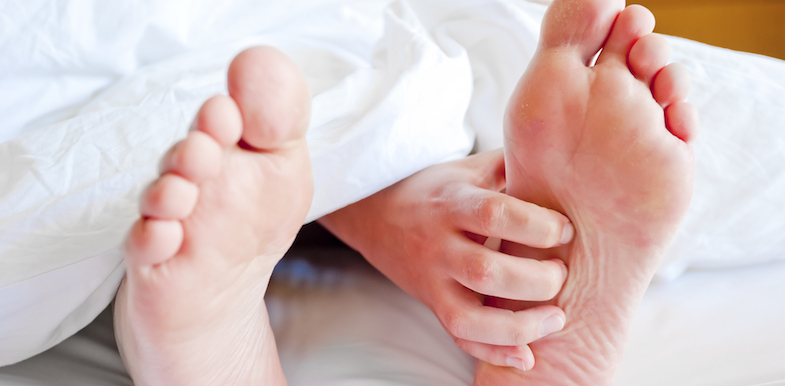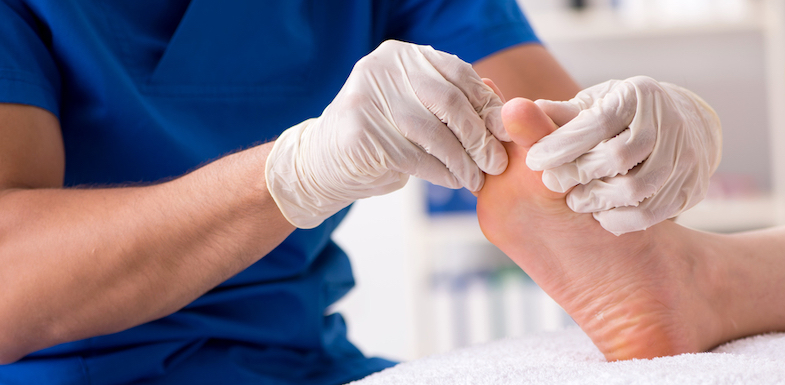Getting a full, restorative night of sleep is something we take for granted, that is, until foot pain at night keeps us tossing and turning. Our feet work hard to support us every day, with little reward or attention until something goes wrong. When you begin to experience foot pain after lying down, here are our tips to relieve foot pain at night.
What causes foot pain at night?
We might be used to foot pain after a long hike or a grueling day on our feet, but there are other foot pain causes that aren’t necessarily connected to these common events. Foot pain can occur in anyone at any age. Child foot pain at night, in particular, can be especially challenging.
Here are the most common causes of foot pain, in adults and children alike.
Plantar fasciitis
The plantar fascia is a long band of connective tissue that stretches from your heel to the ball of the foot. It provides stability for walking and support for the arch of your foot. When the plantar fascia is injured due to overuse (or improper use), inflammation and tightness can cause tremendous foot pain at night.
This condition is known as plantar fasciitis. During the night, your plantar fascia may shorten as the toes point in sleep, making the first step in the morning excruciating. This pain generally gets better for a short period as the day continues, but after a full day of movement the pain flares up, resulting in foot pain at night.
Reflex sympathetic dystrophy
When the foot is injured, swelling and pain are the body’s reflexive, protective response. This tells you something is wrong so that you slow down and care for the injury.
However, sometimes the body takes it too far, offering an abnormal nerve response with excessive swelling, pain, and even temperature changes. The nerves of the foot are essentially hyperactive in their response. This can lead to very sensitive feet that experience painful sensations even with the slightest touch.
Peripheral neuropathy
Peripheral neuropathy involves pain in the nerves reaching towards the extremities. An injury the sciatic nerve, for example, can cause pain all the way down to the feet (where the nerve ends).
Other causes of this type of pain include poorly controlled diabetes (both types I and II), infections, and vitamin deficiencies.
Chronic overconsumption of alcohol
Overconsumption of alcohol leads to poor circulation in the body and a condition called alcoholic neuropathy.
In addition to foot pain at night, symptoms of this condition may also include:
- Burning sensation in the feet
- Muscle spasms
- Loss of muscle control or weakness
Morton’s neuroma
Affecting more men than women, Morton’s neuroma is the thickening of the nerves surrounding the toes—most often the third and fourth toes.
People with this condition experience burning, tingling, and cramping, all of which worsen at night.
Pinched nerves
Pinched nerves in the legs, hips, back, and feet can cause excessive foot pain at night.
In some cases, this occurs as a result of sleeping position. Minor adjustments can go a long way towards relieving this type of pain. In others, the pinched nerve becomes damaged due to injury or other trauma and must be treated to provide relief.
Restless leg syndrome
Those with diabetes, rheumatoid arthritis, low iron, and kidney failure may be familiar with restless leg syndrome that leads to nighttime foot pain.
With this condition, a dopamine imbalance confuses the nerves responsible for sending signals to the brain. More than just legs that cannot seem to be still, this syndrome also comes with burning, tingling, numbness, and pain after lying down. These symptoms occur from the waist down, including the feet.
Bunions
Bunions are hard deposits of bone on the side of the foot just below the big toe or pinkie toe joint (sometimes both). Left untreated, bunions can result in toe pain at night that feels like a stabbing pain sideways through the foot.
Swelling, stiffness in the morning, and soreness at the affected toe joint are also common.
Child foot pain at night: growing pains
The most common cause of child foot pain at night (and one that can wake your children from sleep) is growing pains. Most people assume that growing pains are caused by spurts of growth in the bones that outpace muscles, tendons, and ligaments, but bones grow at an approximately even pace throughout development.
In many cases, growing pains are actually caused by other mechanical issues, such as:
- Gait imbalances
- Structural issues (i.e., being knock-kneed or pigeon-toed)
- Poor posture
- Flat feet or feet that point outwards
- Fatigue
All of these can lead to what feels like shooting, stabbing pains in the feet at night. Typically, growing pains are more severe at night and ease with activity.
When should I see a doctor for foot pain at night?
As stated above, occasional foot pain at night due to a long day or a grueling hike might result in sore muscles all over the body, including the feet. This type pain is nothing to be concerned about and should pass quickly.
However, you should consider seeing a doctor for foot pain at night if your foot pain:
- Is not related to abnormal exertion
- Persists for more than a night or two
- Begins to worsen
- Begins to change or move further into the body (i.e., calf pain or knee pain occurs, too)
- Impacts your mobility during the day
- Is accompanied by visible redness or swelling that is unrelieved by comfort measures (e.g., rest, ice, elevation, and over-the-counter medications)
Foot pain that lasts longer than a couple days is not always a cause for alarm, but it’s best to get it checked out just in case.

How to relieve foot pain at night
The best way to ease foot pain at night is to develop a toolkit of therapies that address the root cause of foot pain while relieving symptoms so you can get a full night’s rest.
Here are our tips for relieving your nighttime foot pain. Always discuss the best course of treatment with your doctor.
1. Start with a proper diagnosis
Successful treatment depends on a proper diagnosis of the cause of your pain. If you simply treat symptoms without addressing the underlying cause, you will continue to experience worsening symptoms (and may cause permanent damage).
2. Rest
Sometimes foot pain at night is a result of a pain condition that worsens with activity during the day.
If you can, takes some time off of your feet, resting those hardworking muscles, tendons, and ligaments.
3. Apply ice
Ice is a magical, free treatment that can ease pain and swelling and provide comfort to feet that ache at the end of the day.
If your feet are red, swollen, or painful to touch, apply ice on a 20-minutes-on, 20-minutes-off schedule for a couple of hours, elevating your feet if possible as you ice.
4. Consider over-the-counter non-steroidal anti-inflammatory drugs (NSAIDs)
When taken correctly, NSAIDs like ibuprofen and naproxen sodium ease pain and reduce swelling. Talk to your doctor about taking NSAIDs before bed to ease your nighttime foot pain.
5. Check your mattress
Sometimes pinched nerves and nerve pain come down to your mattress. Too soft and your body collapses in on itself at night. Too hard and you cannot find a comfortable release into sleep.
You want a mattress that is just right, offering firm support that is also soft and comfortable. Shop for a mattress with a return policy that allows you to test it out and return it if it’s not right for you.
6. Wear a nighttime splint
One of the key treatments for foot pain caused by plantar fasciitis is a nighttime splint.
This keeps the foot in a flexed position so that the plantar fascia does not contract at night. A contracted plantar fascia can mean an incredibly painful first step in the morning. The splint helps maintain the natural length of this crucial tendon.
7. Try yoga
Our feet contain 25% of the bones in our body, have over 30 joints, and are made up of more than 100 muscles, tendons, and ligaments. Yoga that focuses on releasing, strengthening, and stretching the feet can help them become more balanced and suppler.
Find a great video of foot yoga, or bring together a few good stretches and massages for the feet on a daily basis.
8. Refine your nighttime routine
Consider revamping your entire nighttime routine to set the scene for a good night of sleep. Keep your bedroom cool and dark, and reserve it only for intimacy, sleep, and reading before bed.
Develop a consistent nighttime routine that gets your body ready for sleep.
- Drink a relaxing herbal tea (lavender, chamomile, and valerian are all good choices)
- Give your feet some attention before bed by trying yoga for feet at night or self-massage
- Go to bed at the same time every night and wake up at the same time, too
- Turn all screens off at least one hour before bedtime
A nighttime routine helps you mark the end of the day and signals your brain to rest. This alone can go a long way towards a better and more healing night of sleep.
9. Explore physical therapy
Physical therapy helps to gently stretch and strengthen the feet, more so than simple exercise on its own. A physical therapist can also conduct a gait analysis to see if there are structural or mechanical issues that are causing your foot pain.
10. Ask about prescription medications
Although opioid therapy is not indicated for most types of chronic foot pain, there are prescription medications that may offer some relief.
For example, pregabalin, gabapentin, and duloxetine are medications that are used to treat nerve pain, including nerve pain in the feet. Depending on the cause of your pain, your doctor may also recommend muscle relaxers.
11. Try TENS unit therapy
Transcutaneous electrical stimulation (TENS) is a non-invasive treatment option that delivers a mild electrical current to replace pain signals to the brain.
While this does not address the underlying cause, it may help you rest as you try other treatments at the same time.
12. Consider injections
An injection of corticosteroids and a local anesthetic can be used to ease inflammation and swelling that leads to foot pain at night. For radiating foot pain that occurs due to sciatica, an epidural steroid injection or a lumbar sympathetic blockade may help ease pain.
13. Look at more interventional treatments
When conservative treatments do not provide relief, you may find that more interventional treatments are necessary. Spinal cord stimulation and other surgical interventions might be necessary to relieve your foot pain at night.
These more advanced procedures should always be done as a last resort, after you’ve attempted other more conservative therapies.
Learn more
At Arizona Pain, our goal is to help you get a good night’s sleep with the most comprehensive treatment approach possible. Our integrated pain management approach incorporates multiple therapies so you can get back up on your feet as soon as possible.
If you experience foot pain at night, schedule an appointment today to discuss all of your options.
